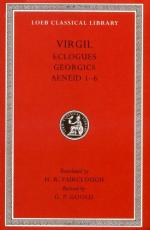|
This section contains 6,011 words (approx. 21 pages at 300 words per page) |

|
SOURCE: “Arcadia: The Discovery of a Spiritual Landscape” in Virgil: A Collection of Critical Essays, edited by Steele Commager, Prentice Hall, Inc., 1966, pp. 14-27.
In the essay below, originally published in 1953, Snell investigates Vergil's manipulation of the pastoral Arcadian setting in the Eclogues, contending that Vergil synthesized Theocritus' s Arcadia with the mythological world.
Arcadia was discovered in the year 42 or 41 b.c. Not, of course, the Arcadia of which the encyclopedia says: ‘The central alpine region of the Peloponnesus, limited off on all sides from the other areas of the peninsula by mountains, some of them very high. In the interior, numerous ridges divide the secetion into a number of small cantons.’ This humdrum Arcadia had always been known; in fact it was regarded as the home of Pelasgus, the earliest man. But the Arcadia which the name suggests to the minds of most of us to-day...
|
This section contains 6,011 words (approx. 21 pages at 300 words per page) |

|


